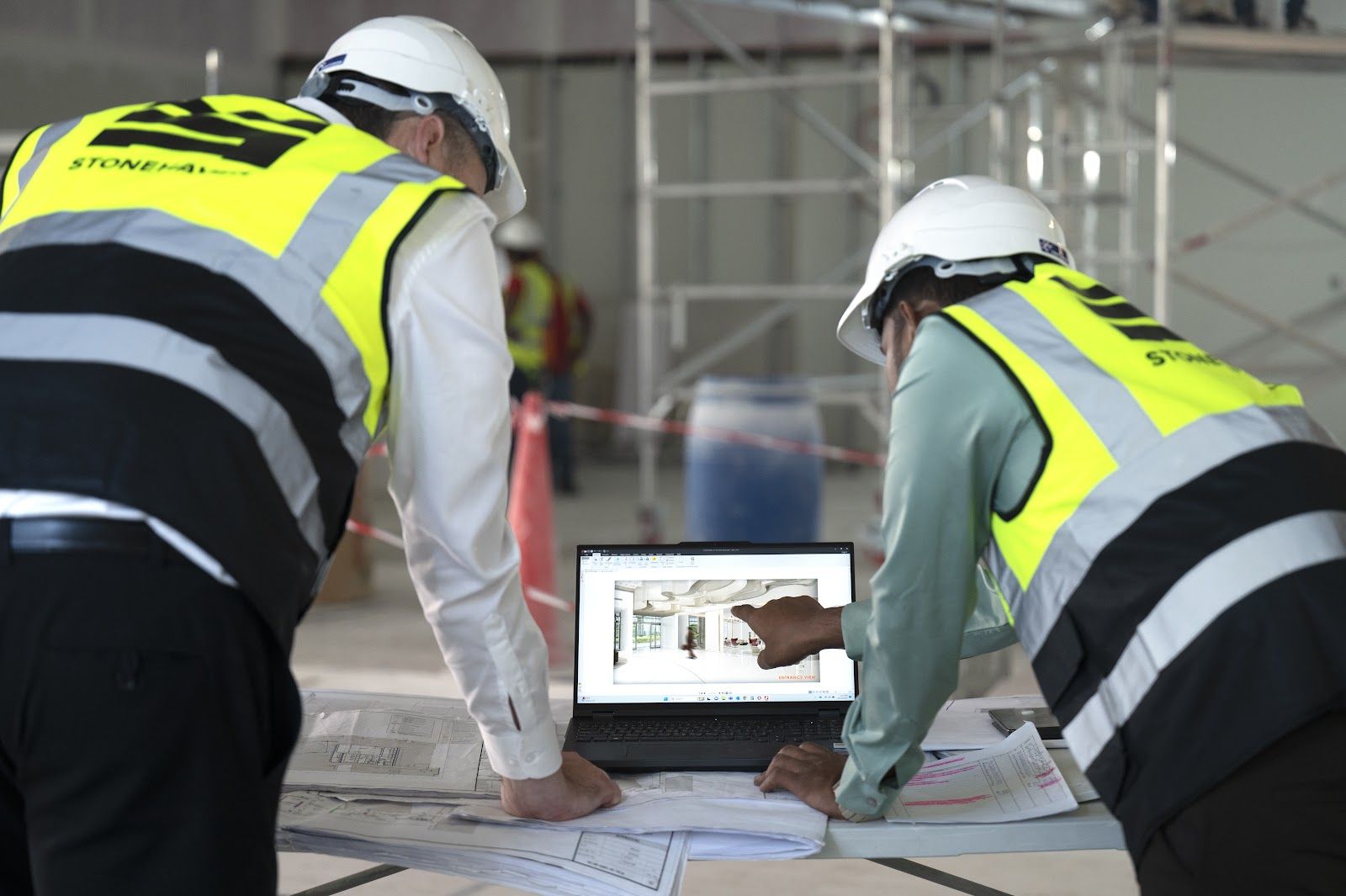Whether it’s Dubai’s ever-expanding skyline or KSA’s mega-projects like NEOM and The Red Sea Development, construction professionals face intense pressure to ensure that budgets are not only met but optimised for long-term value. At the core of this cost management effort are two essential roles: Quantity Surveyors (QS) and Cost Engineers (CE).
Though they share a common goal—controlling costs while maintaining quality—their approaches are distinct. Quantity Surveyors manage finances across the entire lifecycle of a project, while Cost Engineers apply technical expertise to align engineering decisions with financial constraints.
This blog will unpack the distinctions and overlaps between Quantity Surveyors and Cost Engineers, exploring their roles in construction cost management, their applications in Middle Eastern projects, and the benefits they bring to complex developments.
Who is a Quantity Surveyor (QS)?
A Quantity Surveyor is a construction professional responsible for the financial and contractual management of projects. Their role spans the project lifecycle, from feasibility studies to final account settlement. Quantity Surveyors prepare cost estimates, manage tenders, and oversee contracts to ensure projects stay on budget.
A Quantity Surveyor provides the following expertise:
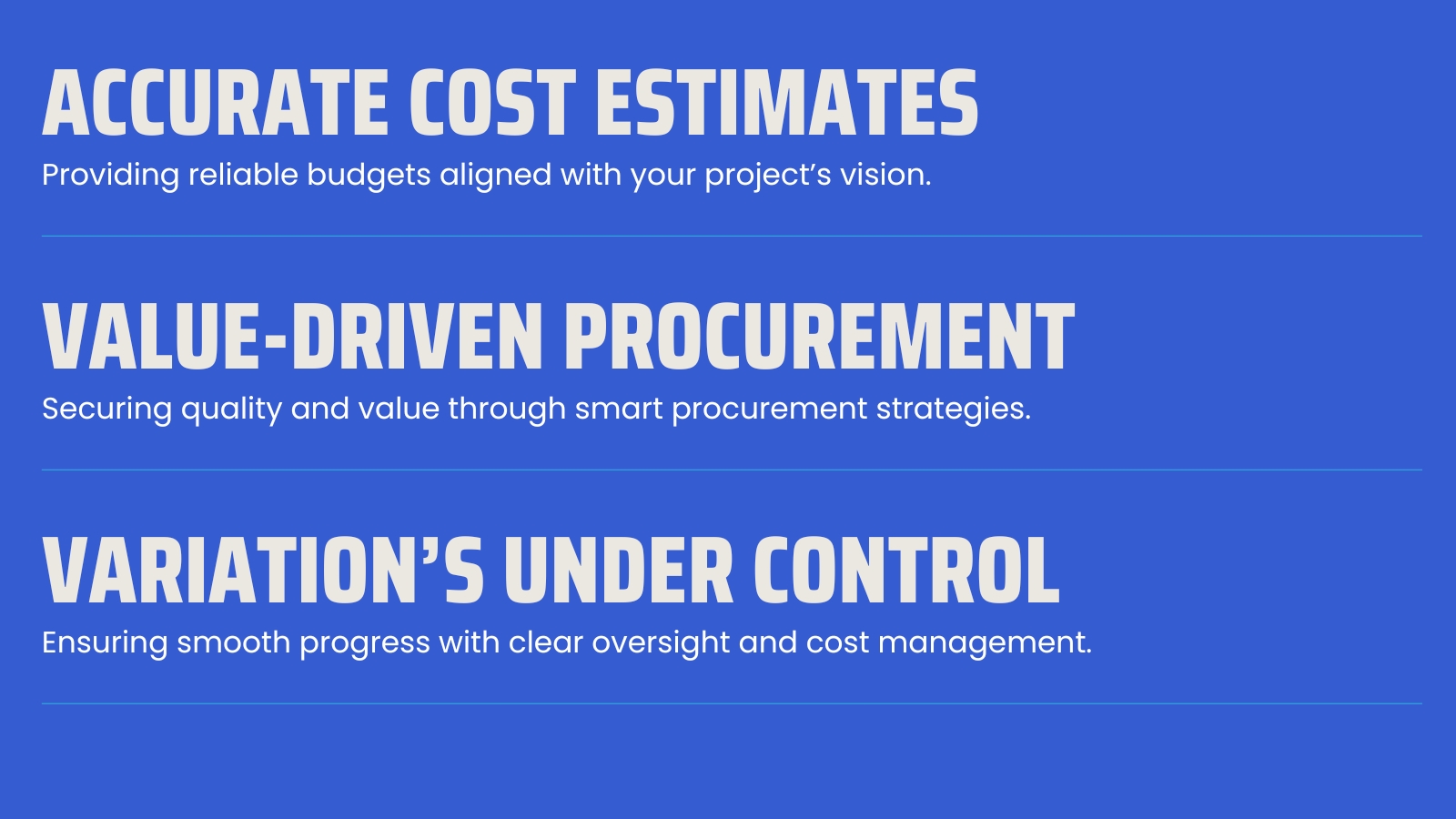
Their expertise lies in understanding the legal, contractual, and financial frameworks that govern construction projects, such as FIDIC contracts, often used in UAE and KSA.
Who is a Cost Engineer (CE)?
A Cost Engineer, on the other hand, focuses on cost control and technical feasibility. Their expertise lies in analysing engineering designs, forecasting costs, and ensuring financial efficiency.
A Cost Engineer offers the following expertise:
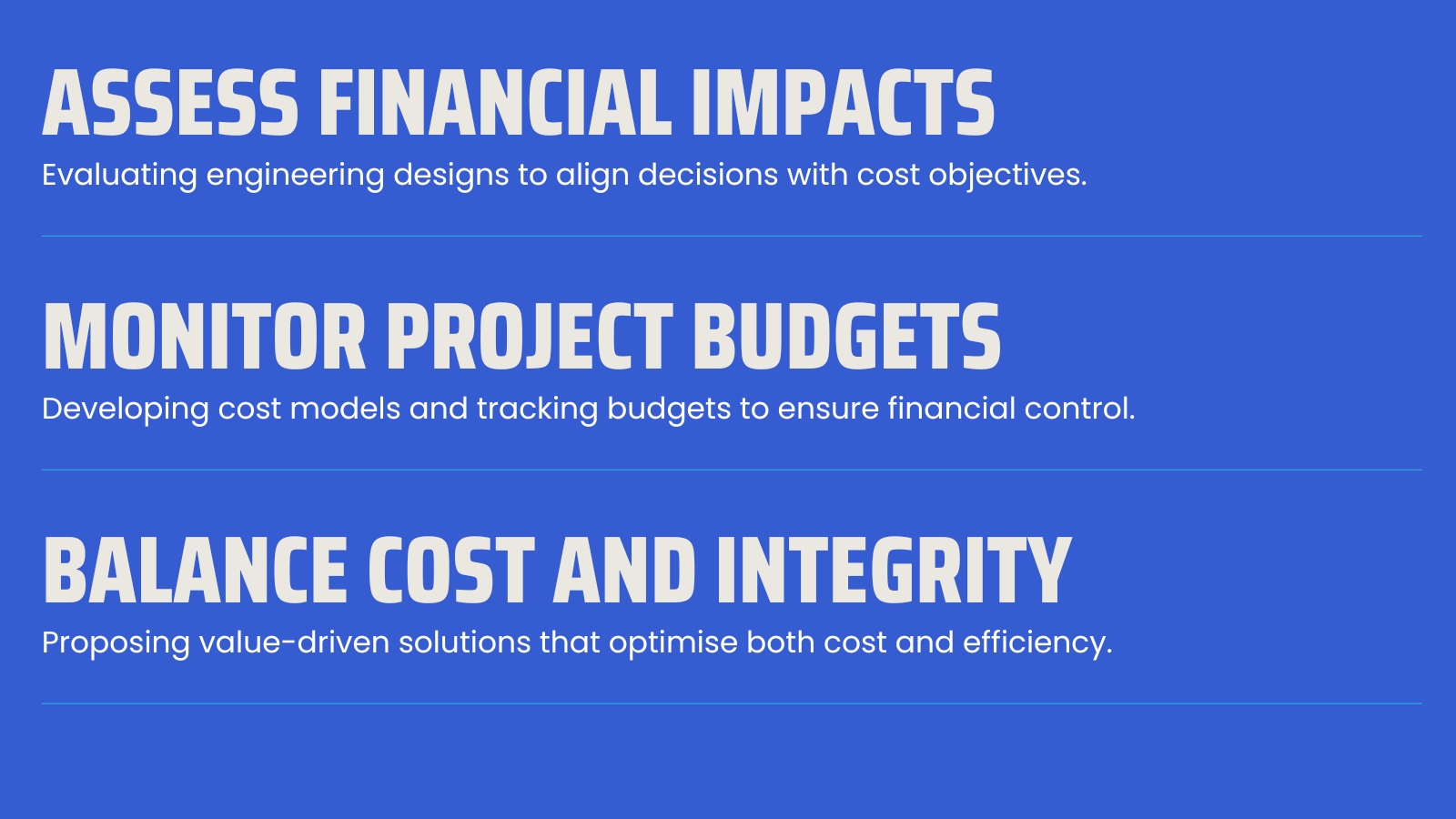
While a Quantity Surveyor takes a broader view of project finances, a Cost Engineer hones in the technical aspects of cost optimisation.
Can You Call Quantity Surveyors, Cost Engineers?
Though they share overlapping responsibilities, Quantity Surveyors (QS) and Cost Engineers (CE) are not interchangeable. While both aim to control costs, their training, expertise, and focus areas set them apart. Let’s explore these distinctions more closely.
Scope of Work
A QS oversees cost management across the project lifecycle. For instance:
- On a luxury hotel project in Dubai, the QS would prepare the tender documents, manage procurement, and monitor cash flow to ensure the budget remains intact.
By contrast, a CE focuses on technical cost control:
- The CE might assess the financial impact of design changes or propose alternative materials to reduce costs.
Competency
While some Quantity Surveyors may upskill in engineering cost analysis and some Cost Engineers may broaden their expertise to include contracts, the roles are fundamentally distinct. Together, they form a complementary team, ensuring cost efficiency from every angle—contractual, financial, and technical.
Academic Background
Quantity Surveyors typically come from construction-focused academic backgrounds, earning degrees in Quantity Surveying, Construction Management, or related disciplines. They specialise in cost estimation, procurement, and contract law, often achieving professional qualifications through bodies like the Royal Institution of Chartered Surveyors (RICS).
Cost Engineers, however, come from engineering fields such as civil, mechanical, or industrial engineering. Their training equips them to apply engineering principles to cost control, focusing heavily on technical and operational aspects of projects.
What are the Fundamentals of Cost Engineering in Construction?
Cost Engineering applies engineering principles to cost control, ensuring that projects meet their financial goals without compromising quality or timelines. This discipline is particularly critical in the Middle East, where projects like NEOM, Expo City Dubai, and The Red Sea Development demand effective cost planning and execution.
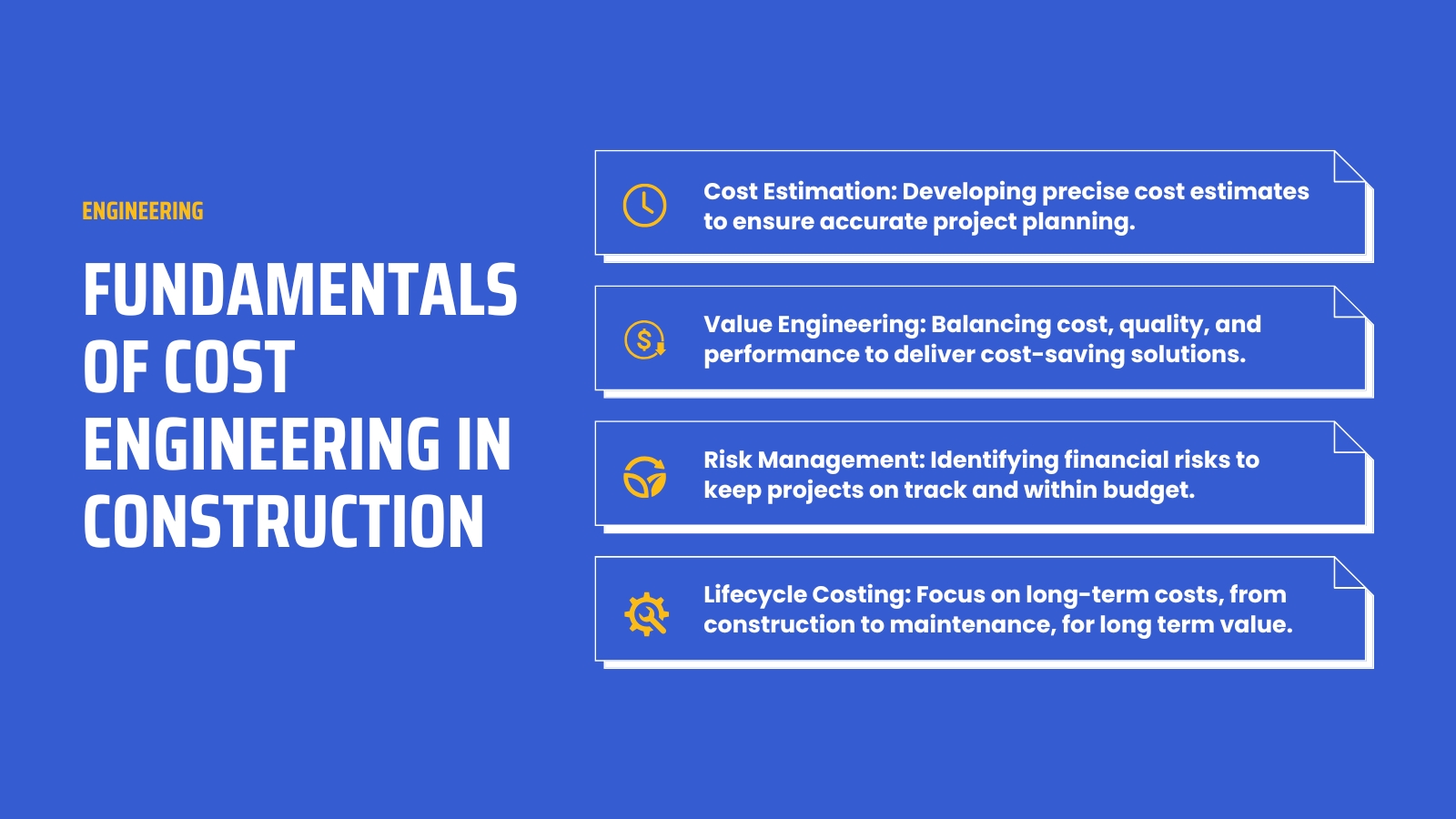
-
Cost Estimation
Cost Engineers create detailed cost estimates during the design phase, considering factors such as materials, labour, equipment, and logistics. For example, in a Riyadh metro project, a CE might estimate costs for tunnelling, track installation, and technical systems. -
Value Engineering
Value engineering involves balancing cost, quality, and performance. In the UAE, for instance, Cost Engineers might assess whether prefabricated construction methods can offer both cost savings and faster delivery timelines. -
Risk Management
Cost Engineers identify potential financial risks, such as supply chain delays or price volatility in imported materials. Mitigating these risks ensures the project remains financially viable. -
Lifecycle Costing
Cost Engineers take a long-term view, considering not just initial construction costs but also the expenses tied to maintenance and operation. This is highly important for renewable projects in order to meet global sustainability goals.
By mastering these fundamentals, Cost Engineers help deliver financially sound projects, particularly in the Middle East’s complex construction landscape.
How Do Quantity Surveyors and Cost Engineers Work Together in Construction Projects?
In the Middle East, construction projects are vast, complex, and require seamless collaboration between Quantity Surveyors (QS) and Cost Engineers. These professionals play distinct yet complementary roles, ensuring that costs are optimised, resources are used efficiently, and projects are delivered on time and within budget. Below are real-world examples of how QS professionals and Cost Engineers collaborate to ensure the success of key construction projects across the UAE and KSA.
How Quantity Surveyors and Cost Engineers Work Together in Infrastructure Projects

Infrastructure development, such as highways, metro systems, and airports, presents immense financial and technical challenges. The Riyadh Metro expansion project is an example of how QS professionals and Cost Engineers worked together to manage these complexities.
- Role of Cost Engineers:
Cost Engineers conducted geotechnical studies and selected optimal tunnelling methods, such as using Tunnel Boring Machines (TBMs), to reduce environmental and structural disruptions. They analysed various construction techniques to minimise material wastage while ensuring long-term durability of the track systems. - Role of Quantity Surveyors:
QS professionals collaborated closely with Cost Engineers to manage the financial aspects of these technical decisions. They prepared detailed cost estimates for excavation, tunnelling equipment, and track installation. During the construction phase, they negotiated contracts with subcontractors to ensure value-for-money deals and monitored budget performance to keep expenses under control.
How Quantity Surveyors and Cost Engineers Work Together in Aviation Projects

These massive aviation projects require seamless collaboration between Quantity Surveyors (QS) and Cost Engineers to manage the complexities of construction, ensure operational efficiency, and deliver a world-class passenger experience.
- Role of Cost Engineers:
Cost Engineers focus on optimising the design and construction of critical airport systems to improve functionality and reduce costs over the long term. For example:
- They evaluate innovative materials and structural designs for large-span roofing systems in terminals, ensuring durability and cost-efficiency.
- Cost Engineers incorporate advanced baggage handling systems and automated passenger flow technologies to streamline airport operations, saving both time and resources.
- Lifecycle cost analysis is conducted to select energy-efficient systems, such as LED lighting, HVAC systems, and solar power installations, reducing operational costs over decades.
- Role of Quantity Surveyors:
QS professionals ensure that the advanced technical solutions proposed by Cost Engineers are financially viable and delivered within budget.
- They prepare detailed cost estimates for critical infrastructure components such as runways, control towers, and passenger terminals, ensuring accurate budget allocation.
- They conduct value engineering workshops to identify cost-saving opportunities without compromising the quality of the airport's design or functionality.
- Manage procurement and negotiate contracts with international suppliers for high-value items, such as jet bridges and specialised materials, to secure competitive pricing.
How Quantity Surveyors and Cost Engineers Work Together in Hospitality Projects

The hospitality industry in the Middle East is synonymous with luxury and innovation. These projects demand planning, blending world-class amenities, intricate designs, and tight budget management. QS professionals and Cost Engineers work together to deliver a seamless balance of opulence and operational efficiency.
- Role of Cost Engineers:
Cost Engineers focus on integrating advanced construction techniques and sustainable systems into the hotel design to reduce long-term operational costs. For example:
- They evaluate energy-efficient HVAC systems and solar power solutions to reduce the hotel's carbon footprint while lowering utility expenses over the building’s lifecycle.
- Cost Engineers use value engineering to identify and implement cutting-edge technologies, such as smart lighting and advanced water recycling systems, ensuring that these features remain within budget constraints.
- Role of Quantity Surveyors:
QS professionals handle the financial side of these innovative solutions, ensuring cost-effectiveness without compromising the project's grandeur. They:
- Prepare detailed budgets that account for premium finishes, such as marble flooring, custom furnishings, and luxury spa installations.
- Conduct cost analyses to ensure that high-quality materials like imported stone and bespoke furniture are sourced competitively.
- Negotiate contracts with international vendors and subcontractors, securing value-for-money deals while maintaining the project’s luxury standards.
What are the Functions of Quantity Surveyors (QS) and Cost Engineers (CE)?
Though their objectives overlap, Quantity Surveyors (QS) and Cost Engineers (CE) serve distinct functions in construction cost management.
Roles of a Quantity Surveyor (QS)
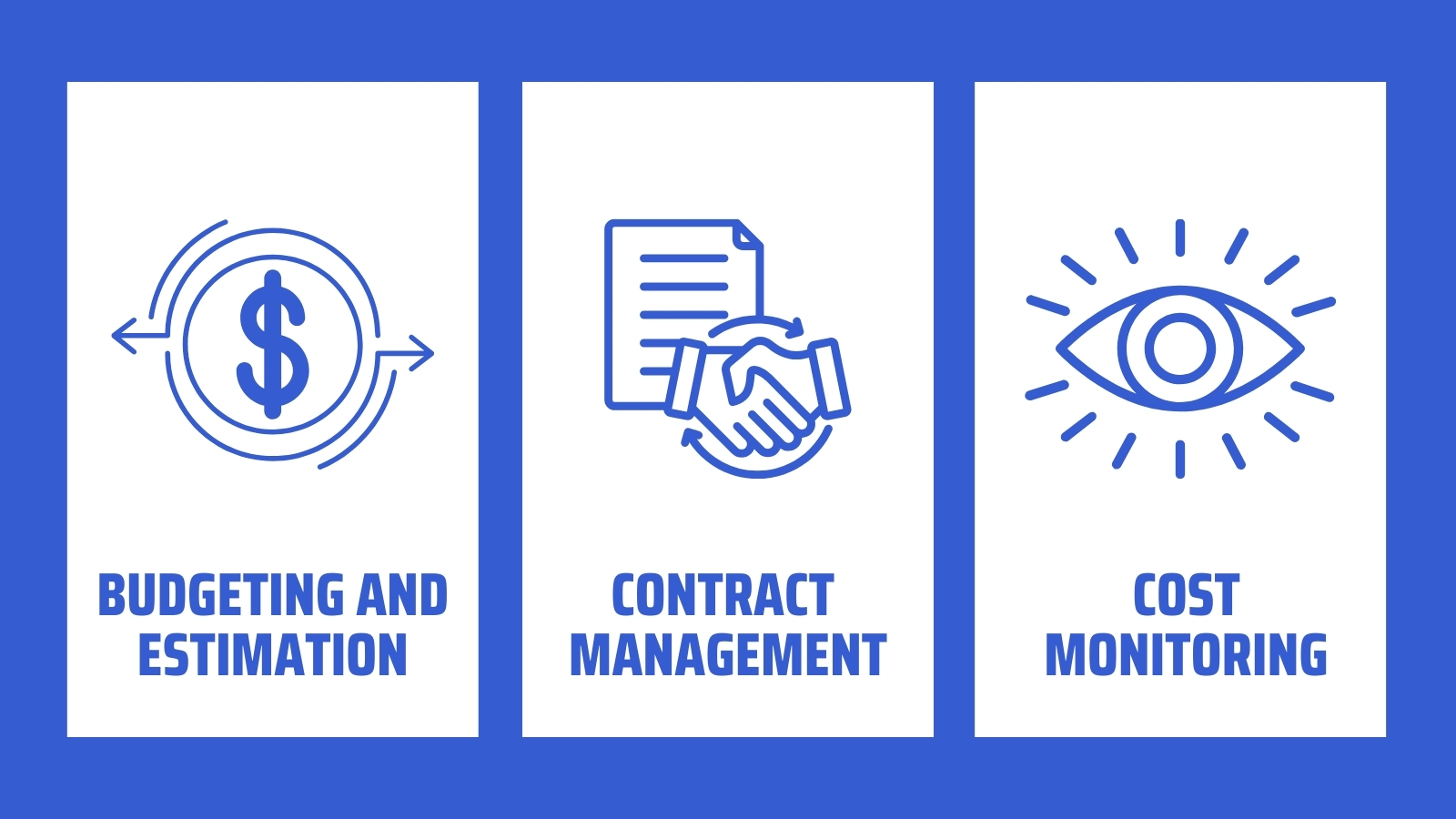
-
Budgeting and Estimation: Prepares cost estimates and ensures that the project remains financially viable from design to delivery.
-
Contract Management: Oversees the tender process, resolves disputes, and ensures compliance with contractual terms.
-
Cost Monitoring: Tracks variations and advises on financial adjustments to keep projects within budget.
Roles of a Cost Engineer (CE)
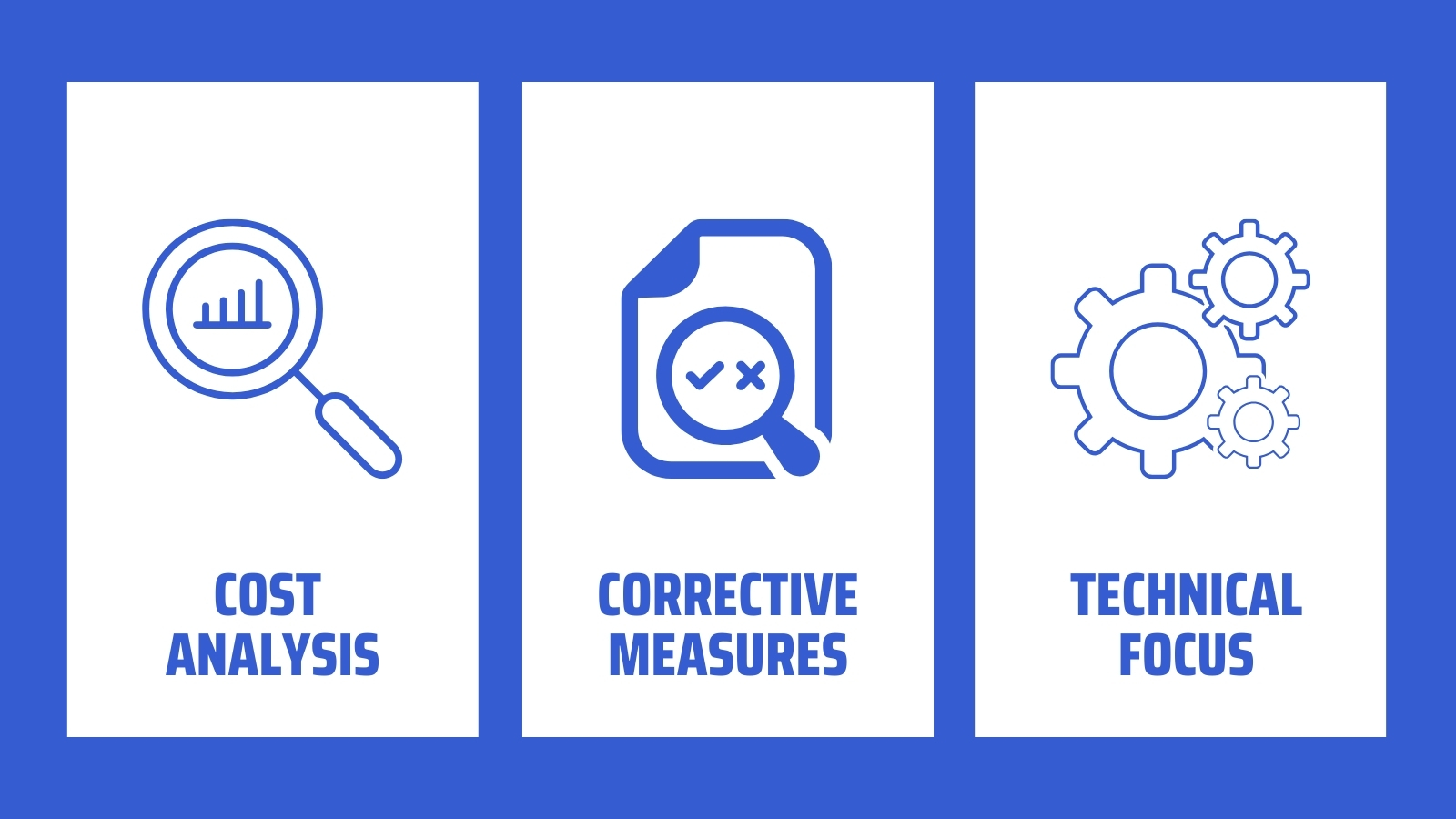
-
Cost Analysis: Develops and manages detailed cost models to ensure engineering designs align with financial constraints.
-
Corrective Measures: Identifies risks such as material shortages or design inefficiencies and implements corrective measures.
-
Technical Focus: Monitors the financial impact of technical decisions, such as changes to equipment or construction methods.
Together, these professionals form a robust cost management framework, ensuring that every aspect of the project—from contracts to technical designs—is optimised for financial success.
What are the Benefits of Hiring a Quantity Surveyor and Cost Engineer?
Both QS and CE professionals bring unique benefits to the construction process, making them essential for successful project delivery.
Benefits of Quantity Surveyors:
-
Legal and Contractual Expertise: Their knowledge of contracts ensures smooth project execution and minimises disputes.
-
Holistic Financial Management: QS professionals manage costs across the entire project lifecycle, ensuring budgets remain intact.
-
Procurement Knowledge: They secure the best value during tendering processes.
Benefits of Cost Engineers:
-
Technical Cost Expertise: Their focus on engineering ensures that technical designs are aligned with financial objectives.
-
Value Engineering: CEs identify cost-saving opportunities without sacrificing quality.
-
Risk Reduction: Their ability to foresee and address technical risks prevents costly overruns.
When combined, QS and CE expertise provide a well-rounded approach to construction cost management.
Conclusion
The construction industry in the Middle East is growing at an unprecedented pace, driven by ambitious projects like Dubai’s luxury developments and KSA’s mega-initiatives. In this environment, the roles of Quantity Surveyors (QS) and Cost Engineers (CE) are vital for ensuring financial success. While QS professionals oversee budgets, contracts, and disputes, CEs focus on technical feasibility and cost optimisation.
Together, they bring complementary skills to the table, ensuring that projects are delivered on time, on budget, and with maximum value. For developers, contractors, and project managers, understanding the distinction between these roles is key to building smarter and more efficiently.
About us
At Stonehaven, we specialise in providing expert cost management services for the construction industry across the UAE and KSA. Whether you need a Quantity Surveyor to manage contracts and budgets or engineering consultants to optimise your technical decisions, we bring the expertise to ensure your project’s financial success.
By combining in-depth knowledge of local markets with global best practices, we tailor our services to meet the unique challenges of each project, whether it's a luxury hotel, a major infrastructure development, or a private aviation hub.
Let’s build smarter, together.









